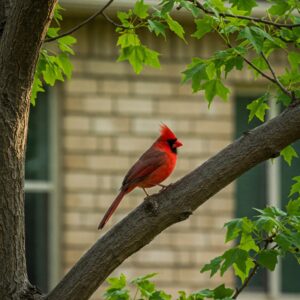
Did you know that half of the birds that fly into windows die from the trauma? At our Houston glass company, we hear about this daily. When birds see a window, the reflection of the sky or nearby foliage might look like clear sailing, but windows are death traps for these small creatures. Studies estimate that hundreds of millions to nearly 1 billion birds die annually in the U.S. from collisions with windows and glass doors.
As a glass company in Houston, we know how to help birds avoid your windows. We’ve been updating and replacing glass windows and doors in Houston homes for over 50 years! For all your residential glass needs, contact our team at Northwest Glass & Mirror.
Why Birds Collide with Windows
In the daytime, birds fly into windows because they see a reflection, or they see through the glass and notice plants or flowers on the other side. Night flyers tend to fly into illuminated windows that protrude into their airspace. For some unknown reason, the light from Houston residential glass diverts the nocturnal travelers from their original path. They might collide with the glass or with each other in foggy or low-ceiling conditions. During mating season, birds attack their own reflections, which they believe are rivals.
Tips to Prevent Collisions – Houston Glass Company
Fortunately, there are many ways to reduce the risk of birds hitting your windows. Some effective methods include:
- Applying decals or stickers to the outside of the glass. These need to be spaced closely together (no more than 2 inches apart in all directions for small birds).
- Hanging cords or “zen curtains” on the outside of windows.
- Applying window films or tapes that make the glass more visible to birds.
- Reducing reflections by closing blinds or curtains, especially on windows where collisions occur.
- Moving indoor plants away from windows.
- Turning off unnecessary outdoor and indoor lights at night, especially during migration seasons (spring and fall).
- Place netting or screening outside the window. Make sure it is tight and at least 3 inches from the glass so that it can absorb the impact of a collision.
- Keep bird feeders or baths within 3 feet of any problematic windows. Then, the birds cannot reach top speed after eating or bathing.
- Keep the slats on vertical blinds halfway closed.
- Cover the glass with a one-way film that is transparent from the inside and appears opaque on the outside.
How to Help a Wounded Bird
If the bird is unconscious, gently put it in a cardboard box that has air holes. Refrain from handling it, and check its condition every 30 minutes. When it has revived, take it outside and open the box. If it flies away, you have done your job. Repeat this process for a maximum of 2 hours.
If it is still breathing but seemingly unable to move, or if it has an obvious injury such as a broken wing, you can reach out to a wildlife rehabilitator such as the Houston SPCA Wildlife Center of Texas or the TWRC Wildlife Center (Texas Wildlife Rehabilitation Coalition).
Protect Your Windows with a Houston Glass Company
As your trusted local glass company in Houston, we’re here to help keep your home safe for your family—and our feathered friends. Northwest Glass & Mirror can repair or replace your Houston residential windows and doors or any type of glass project in your home. Get in touch with us today.
Save

